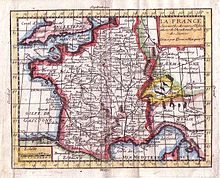- Claude Buffier
-
Claude Buffier (25 May 1661 – 17 May 1737), French philosopher, historian and educationalist, was born in Poland, of French parents, who returned to France, and settled at Rouen, soon after his birth.
Society of Jesus History of the Jesuits
Regimini militantis
Suppression
Jesuit Hierarchy
Superior General
Adolfo Nicolás
Ignatian Spirituality
Spiritual Exercises
Ad majorem Dei gloriam
Magis
Discernment
Famous Jesuits
St. Ignatius of Loyola
St. Francis Xavier
Blessed Peter Faber
St. Aloysius Gonzaga
St. Robert Bellarmine
St. Peter Canisius
St. Edmund CampionHe was educated at the Jesuit college there, and was received into the order at the age of nineteen. A dispute with the archbishop compelled him to leave Rouen, and after a short stay in Rome he returned to Paris to the college of the Jesuits, where he spent the rest of his life. He seems to have been a good teacher and lucid expositor.
Works
His object in the Traité des vérités prèmieres (1717), his best-known work, is to discover the ultimate principle of knowledge. This he finds in the sense we have of our own existence and of what we feel within ourselves, He thus takes substantially the same ground as Descartes, but he rejected the a priori method. In order to know what exists distinct from the self, common sense is necessary. Common sense he defined as that disposition which nature has placed in all or most men, in order to enable them, when they have arrived at the age and use of reason, to form a common and uniform judgment with respect to objects different from the internal sentiment of their own perception, which judgment is not the consequence of any anterior judgment.
The truths which this disposition of nature obliges us to accept can be neither proved nor disproved; they are practically followed even by those who reject them speculatively. But Buffier does not claim for these truths of common sense the absolute certainty which characterizes the knowledge we have of our own existence or the logical deductions we make from our thoughts; they possess merely the highest probability, and the man who rejects them is to be considered a fool, though he is not guilty of a contradiction.
Buffier's aversion to scholastic refinements has given to his writings an appearance of shallowness and want of metaphysical insight, and unquestionably he failed entirely even to indicate the nature of that universality and necessity which he ascribed to his eternal verities; he was, however, one of the earliest to recognize the psychological as distinguished from the metaphysical side of Descartes's principle, and to use it, with no inconsiderable skill, as the basis of an analysis of the human mind, similar to that enjoined by Locke. In this he has anticipated Thomas Reid and the Scottish school. Voltaire described him as the only Jesuit who has given a reasonable system of philosophy.
He wrote also Elements de metaphysique (1724), a French Grammar on a new plan, and a number of historical essays. Most of his works appeared in a collected form in 1732, and an English translation of the Traité was published in 1780.
References
 This article incorporates text from a publication now in the public domain: Chisholm, Hugh, ed (1911). Encyclopædia Britannica (11th ed.). Cambridge University Press.
This article incorporates text from a publication now in the public domain: Chisholm, Hugh, ed (1911). Encyclopædia Britannica (11th ed.). Cambridge University Press.
Categories:- 1661 births
- 1737 deaths
- 17th-century French Jesuits
Wikimedia Foundation. 2010.


